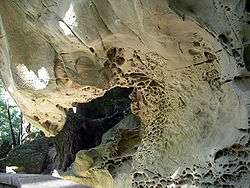Tafoni

Tafoni (singular: tafone) are small cave-like features found in granular rock such as sandstone, granite, and sandy-limestone with rounded entrances and smooth concave walls, often connected, adjacent, and/or networked. They often occur in groups that can riddle a hillside, cliff, or other rock formation. They can be found in all climate types, but are most abundant in intertidal areas and semi-arid and arid deserts. Explanations of their formation include salt weathering, differential cementation, structural variation in permeability, wetting-drying, and freezing-thawing cycles, variability in lithology, case hardening and core softening, and/or micro-climate changes and variation (that is, moisture availability). Tafoni have also been called fretting, stonelace, stone lattice, honeycomb weathering, and alveolar weathering.
Tafoni features have been found across the Earth, with dramatic forms found in the Jodhpur-Ajmer section of India's Thar Desert, Petra, Jordan, Coastal California and Australia, and even in the Arctic regions, and Antarctica (Paradise 2011).
The etymology of the word "tafoni" is unclear. Tafoni may come from the Greek word taphos, "tomb", or it may stem from a Corsican or Sicilian word for "holes", taffoni, or from tafonare meaning "to perforate". The earliest known publication of the term “tafoni” was in 1882.[1][2] Conventionally, the word 'tafoni' is the plural form of 'tafone'.

Tafoni from Antarctica 
Tafoni formation in the mountains near San Francisco. 
Tafoni in sandstone, Südpfalz, Rheinland-Pfalz, Germany 
Tafoni at Elgol, Isle of Skye 
- Tafoni formations, named Gatbawi (Hat Rock), found on the shore of Mokpo's east harbor, near the mouth of the Yeongsan River, South Jeolla Province, South Korea.
See also
- Honeycomb weathering, a similar weathering feature
References
- ↑ Etymology, at Tafoni.com
- ↑ Hans Henrik Reusch (1882) "Notes sur la géologie de la Corse" (Notes on the geology of Corsica), Bulletin de la Société géologique de France, 3rd series, 11 : 53-67 ; see p. 65. From p. 65: "Le peuple appelle ces cavités, quand elles sont petites, des tafoni ; quand elles sont grandes, des grotte." (People call these cavities, when they're small, tafoni ; when they're large, caves.)
- Stoppato, Marco, and Alfredo Bini. Deserts. Buffalo: Firefly Books (U.S.) Inc., 2003. ISBN 1-55297-669-6 pp. 30–32
- Owen, Athena M., 2007, Tafoni Caves in Quaternary Carbonate Eolianites: Examples from the Bahamas. Masters Thesis, Mississippi State University, 179 pp.
- Paradise, T.R. 2011. Tafoni and weathered stone basins, in Geomorphology (G. Pope ed.), Reed-Elsevier Geosciences Reference Series MORP v.4: 28pp
External links
- www.tafoni.com Comprehensive explanation of tafoni, explanations of how they form, images, references
- Gallery of tafoni along California's Central Coast
| Wikimedia Commons has media related to Tafoni. |